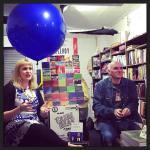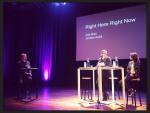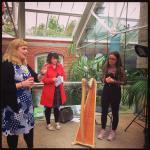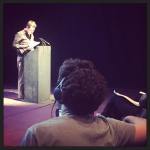So You Think You’d Like To Run A Book Festival?





I’ve been a terrible blogger. It’s over a month since I last wrote anything on here, (closer to two, if I’m being honest). Book Festival season used to kick off in June and run through to about the end of September but every year, like the advent of Christmas, it seems to be starting earlier and earlier. This year I have been festivaling since the middle of April and, between travel and finishing up the edits on the next novel, I’ve somewhat neglected my blogging duties. Usually, I like to write up a quick account of each Book Festival I get to be part of. It helps me to remember where I’ve been, who I’ve met and what I got up to. It’s also a way of letting the festival organisers know you’ve appreciated all their hard work. I programme festivals so I know what it’s like to be on the other side of the microphone, running round like a headless chicken making sure writers are picked up from the station and fed and properly wired into the correct amps. If a festival goes smoothly people don’t tend to notice all the folks in the background working their asses off to ensure nobody notices they’re there. However, when I’ve got my, “I’m just a writer this week,” hat on, I always notice these people, because most weeks, I’m one of them.





And so, I faithfully promise to blog about all the wonderful festivals I’ve been involved with in the last few weeks: Hillsborough Festival of Literature and Ideas, European Literature Nights in The Netherlands, the European Festival of the Short Story in Croatia, Newcastle Poetry Festival, (where I was blissfully just a punter, neither reading nor organising anything), and Belfast Book Festival which kicks off this week and includes our very first ever LitCrawl. It’s a bit presumptive to say I’m going to blog about something which hasn’t happened yet but I’m pretty confident that two weeks from now I’ll be absolutely knackered and waxing lyrical about what a marvellous time I’ve had at BBF. (May the weather be moderate, may the Q and A’s be semi-sensible for a change, may the cheese in the Green Room be even better than last year and may Oisin Fagan rock up in an even more lurid jumper than last year). For now, here are some lovely festival snaps and a few things I’ve learnt about running Book Festivals from the good folks who’ve hosted me so well over the last few weeks.





Hospitality is everything. Lots of people are now attending literary events because they want to find community and meet people. Yes, they’re interested in hearing an author read. But, if they can also meet some bookish people they didn’t know before then that’s a massive bonus. Dispensing with the traditional rows of chairs and arranging the seats around small tables, makes it easier for people to start conversations. Utilising your most friendly volunteers as welcomers who can connect people with shared interests is also a good idea. Cake also helps. It’s not just being overly nice. Attendees who find community at events are much more likely to return for others events in your programme. They may even spend money.
Treat your authors well. Good food. Good wine and a comfortable place to rest go an awfully long way towards putting a writer at ease and you are much more likely to get a good interview or reading out of someone who’s content and well slept rather than someone who’s been up all night, listening to a Hen Party kicking off in the next room over at the Travel Lodge.
Free stuff is great. Now, I’m not one to turn up my nose at a festival tote bag. Heaven knows I’ve gone on about that double gusseted wonder from Dundee Book Festival for over a year now. But branded liquor, a nice moleskin notebook, a t shirt with your favourite dead writers printed on the front: these are the sort of free gifts which are more like bribes and that’s no bad thing. Plus, with the right kind of branding, you’ll be getting some lovely free advertising for next year’s festival.
You don’t have to read in a library. Some of my favourite events of the last few months have taken place in the oddest venues: a Quaker Meeting Hall, a Victorian Green House, an underground Jazz Club, a wooden hut in the middle of a park. You need to ensure you can mic these quirky reading venues well, if people can’t hear then it doesn’t matter where you’re event is -Buckingham Palace, the tip of the Eiffel Tower, George Saunder’s living room- it’ll still be a dismal failure. However, if you have got some interesting buildings you can use, do utilise them, because you’ll be giving your audience the sort of unique experience they won’t mix up with any of the other readings they’ve previously attended. (Nb. ensure you have adequate seating for everyone attending. You don’t want audience members remembering your event because they ended up putting their back out after standing in one spot, craning their neck around a pillar for three hours).
Keep it neat. I’m writing this in Croatia, where things start late and run long. That’s just the way it is and actually, after six straight days of doing things Croatian-style I’m starting to come round to their laid-back version of a literary event. It certainly keeps things relaxed. However, I still stand by my long-held belief that no literary event need be longer than 70 minutes, (no film need be longer than 90 minutes either – Lake Placid‘s only 87 minutes and it’s an absolute classic). People get fidgetty once you’ve breached the hour mark. Keep it short and interesting and leave them wanting more. (See also: “there’s no call for more than 3 writers on a panel” and “ten minutes is more than long enough for a reading.”)
Volunteers form the foundations of every good Book Festival. Put some effort into tracking down decent volunteers; the sort who turn up early, stay late and take the initiative when something needs doing. When everything starts to go pear-shaped and you’re running on three hours’ sleep, you will thank past you for taking the time to recruit those three volunteers with a bit of sense rather than the rake of recently graduated students with cool hair who really only wanted a free t shirt and an opportunity to grab a selfie with the only well-known writer you’ve been able to afford. Make sure your volunteers have lots of pizza and beer, or tea and scones, or free biros; whatever their little hearts desire. Tell them loudly and repeatedly that they are wonderful and you hope they come back next year and possibly clone themselves in the interim.
Be creative with your budget. This one’s mostly for those of us trying to work miracles with the ever-diminishing arts budget in NI. If you’ve not got the budget for Margaret Atwood or Neil Gaiman, (and I certainly don’t), then programme great writers you can afford and present them in a slightly more creative way so your audience are getting a new experience even if they’ve heard this writer many times before. Experiment with interesting pairings. Choose a theme for the reading. Partner the writer with a musician or a different genre of writer. Put your event in an odd location. Some of these wildcard events have ended up being the most memorable I’ve ever attended.
Create space. Writers travel a lot, especially at this time of the year. Make sure people are given lots of time to rest and explore the place they’re visiting. Also, make space for your writers to spend time with each other. Writing is a weird profession. It’s lonely and sometimes baffling. The people who understand writers best are often other writers. Ensuring they have time to connect over meals and in the green space is one way to help writers make connections and find little pockets of community while they’re zipping about the festival circuit. (Wine will also really help with this process).
Befriend your bookseller. Behind every good book festival there’s a man or woman frantically carting cardboard boxes from the back of a hatchback to a trestle table and trying to get a card machine to work with zero reception. Take time to thank your bookseller. If writers can’t sell their books, there’s not much point in them coming to Book Festivals and the whole cycle of interdependency breaks down. The odd wee cup of coffee and thank you from the stage will help your bookseller to feel appreciated. If you’re feeling particularly generous you may even wish to help lug a cardboard box around.
Only work with good people. I’ve said it before. It bears repeating so I’ll say it again. Only work with good people. Programme the sort of people who turn up, on time, do what you’ve asked them to do and appear to enjoy it. If your gut’s saying “high maintenance” about a particular writer, then listen to your gut. It doesn’t matter how many tickets you think they’ll shift, if working with them gives you a three day migraine and after the festival, you can’t say their name without visibly twitching for the rest of your adult life, then it’s just not worth it. I’ve been there. I can verify that it’s not worth the hassle. I won’t be booking those writers again. If you want a list of wonderful people who are great to work with I’m happy to recommend writers. Thankfully this list is about ten times longer than the difficult list.







